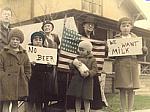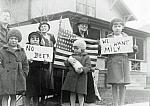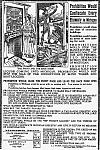
Political Failure, Social Success: Prohibition in GR
by S. Brandon Stone, Grand Valley State University
published: June 4th, 2011
Since its repeal in 1933, National Prohibition, the “Great Social Experiment,” in alcoholic prohibition is typically viewed as a quixotic venture foisted on an unsuspecting public by narrow-minded government figures. However, the effort at prohibition in 1918 was not a new experience for Grand Rapidians. Two years earlier, in November of 1916, the citizens of Michigan voted by a margin of 353,378 to 284,754 to prohibit sale or manufacture of any intoxicating beverage. Within Kent County, twenty-one of twenty-two townships and seven of twelve city wards affirmed the measure, making the city among the few that shared their rural neighbor’s views. This victory for “dries” came not from a new movement, but one that emerged from grassroots organizing by women and rooted in the nineteenth century. (Find more information to your right in Related Items)
Though Michigan had opted to be "dry" from 1853 to 1876, enforcement had proved to be a major obstacle. The growth of alcohol production and consumption in saloons fostered the creation of groups like the Women's Prohibition Society and the 1874 formation of the Michigan Women's Christian Temperance Union, part of the national organization.
The effort focused on the impact of alcohol on women and children, and relied on the backing of local Protestant churches to spread the message. The WCTU would advance temperance throughout the 1880s and 1890s. Joined by the male-led Anti-Saloon League, the pressure groups expanded from local option, to state bans, all leading eventually to the 18th Amendment.
The statewide effort for the prohibition measure during 1916 united dry organizations for passage. "Wets" pushed back noting the difficulty in enforcing such a ban, and that it would spark a trade in illegal alcohol. A coalition of brewers and "home rule" advocates undertook a full-scale advertising campaign arguing that a prohibition measure would lead to property confiscation and scoffing at notions that alcohol increased insanity rates.
Opponents also appealed to immigrant groups, particularly Germans, that dry efforts masked anti-immigrant sentiment behind moral appeals. Wets found themselves on the losing-side of an argument that relied on moral appeals and the preservation of the family.
The successful passage of prohibition in Michigan and other states received a further boost from World War I grain conservation efforts and appeals to patriotism. Additionally, dries argued that the closure of saloons would reduce crime and public menaces. The legislation that created the 18th Amendment in 1918 did not include an enforcement provision leaving that task to local authorities.
In Grand Rapids, the effort drew the support of the Citizens' League to aid in the enforcement of prohibition. They also relied on citizen participation to achieve their goals. The first method, the Citizens' Complaint Card, was originally used in the Detroit area to help the enforcement of vehicle hit and runs by giving a means in which eyewitnesses might be able to "silently" assist the police with information such as a license plate number.
The Citizens' League used the cards to give people a "silent" means to aid the enforcement of morality, or "snitch" on a neighbor drinking to all hours of the night. The Loyalty Oath Card provided a means of deterrence based on persuasion, notably an appeal to patriotism and fealty to the Constitution. If one swore their loyalty to the United States, they were in turn swearing to abide by 18th Amendment and vowing to be alcohol free.
Despite popular perceptions that everyone drank, studies have shown that millions of citizens did not drink and that consumption did not return to pre-1918 levels until the 1970s. Efforts at policing those who did drink, however, became more intrusive and expensive souring the public on the prohibition effort.
The repeal of the 18th Amendment in 1933 cemented the "failure" of prohibition in the public mind. But that ignores the fact that far from a plan cooked up by government bureaucracies or a government think-tank, support for prohibition in Michigan came from a grassroots network of organizations that believed that their efforts improved their communities and families, no matter the political cost. Prohibition as a political entity may be viewed as a failure but as a social issue it was a success.

Michigan followed Maine's idea for prohibition in 1853, but, it was found impossible to do enforce this ideal in Grand Rapids. By 1870, Grand Rapids housed 58 saloons and five breweries. Women's organizations for prohibition, were an understated part of keeping alcohol out of Michigan. Under the leadership of Abigail Hastings of Lansing, she formed the Michigan Women's Christian Temperance Union to fight for the ban of alcohol.
Bibliography
Items Available at the History & Special Collections Dept. of the GR Public Library
- Citizens League Papers
- Dorothy Kiester Collection
- Womens Christian Temperance Union Collection
- Search Prohibition in the library catalog for a large number of available books










 facebook
facebook

